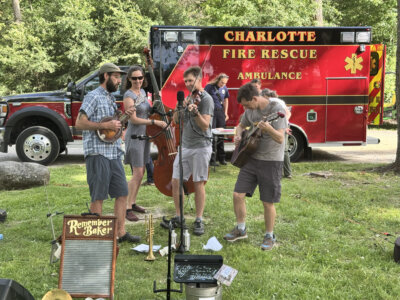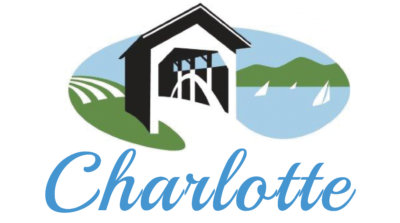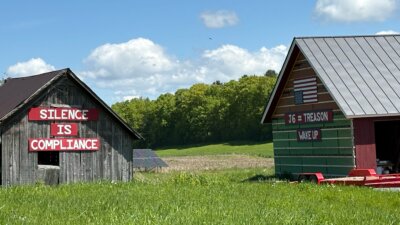Charlotte looks to rejuvenate town meeting
For three years, being the Charlotte town moderator may have seemed like being the lonely Maytag repairman in television commercials of yore, who complained ad nauseam (Latin for advertising nauseau?) about there not being any washing machines for him to repair.
Town moderator Charlie Russell laughs at the comparison but admits that, with no traditional Town Meeting Day since 2020 because of the threat of COVID, he hasn’t been doing much moderating.
Many town moderators “found themselves ‘unemployed’ for a couple of years while Vermonters voted by Australian ballot to ensure the continuity of Vermont’s democracy through the state of emergency,” said a report the Vermont League of Cities and Towns released as more towns were returning to in-person town meetings.
The Vermont League of Cities and Towns’ Ted Brady said they combed through 225 warnings and thousands of articles “to get the pulse of Vermont’s town meeting” last year. Their conclusion: “Town meeting is back.”
Russell looks forward to stepping back into his position’s moderating shoes this year when Charlotte returns to sort of a traditional town meeting. Like the town meetings of yesteryear that Vermont is known for, the town will hold a town meeting with voting by voice vote from the floor, a budget that is approved from the floor, the right for residents to introduce amendments to that budget from the floor — but it will be a town meeting with a nontraditional time.
The town’s in-person meeting day will be at 9 a.m., Saturday, March 2. Selectboard members hope lots of people will come to participate in this meeting that takes place in the Charlotte Central School multi-purpose room.
Selectboard chair Jim Faulkner said the change to a Saturday, in-person town meeting is being tried in hopes of increasing participation in the voting process and as a way of making town meeting “more of a community get-together.” It is also hoped that more people will be able to attend town meeting on a Saturday if they don’t have to be at work like most would be on a Tuesday.
At town hall from 7 a.m.-7 p.m., March 5, the first Tuesday in March and the day historically designated as Town Meeting Day for most Vermont municipalities, Charlotte will hold voting in the privacy of the voting booth for those issues and elections the town decides by Australian ballot, such as the school budget, the presidential primary and town offices.
Open town positions
Among town offices that will be up for election on the March 5 Australian ballot are:
- Auditor — two positions open — three-year term expiring 2027 and two years of three-year term expiring 2026
- Cemetery commissioner — three positions open — three-year term expiring 2027 (James LaBerge, incumbent), one year of three-year term expiring 2025 and two years of three-year term expiring 2026
- Champlain Valley School District board — one position open — three-year term expiring 2027 (Meghan Metzler, incumbent)
- Charlotte Library trustee — one position open — five-year term expiring 2029 (Jonathan Silverman, incumbent)
- Delinquent tax collector — one position open — one-year term expiring 2025 (Mary Mead, incumbent)
- Moderator — one position open — one-year term expiring 2025 (a not-so-lonely, Charlie Russell, incumbent)
- Road commissioner — one position open— one-year term expiring 2025 (Hugh Junior Lewis, incumbent)
- Selectboard — two-year & three-year positions open — two-year term expiring 2026 (Louise McCarren, incumbent) and three-year term expiring 2027 (Frank Tenney, incumbent).
McCarren has confirmed that she is running for re-election. Tenney couldn’t be reached for confirmation. - Town clerk — one position open — three-year term expiring 2027 (Mary Mead, incumbent)
- Town treasurer — one position open — three-year term expiring 2027 (Mary Mead, incumbent)
- Trustee of public funds — two positions open — three-year term expiring 2027 (Maurice Harvey, incumbent) and one year of three-year term expiring 2025.
Candidates need to submit petitions with at least 30 signatures to the clerk’s office by 5 p.m., Monday, Jan. 29.
How to grow town meeting?
The change to a Saturday town meeting was another attempt by Charlotte to try to increase attendance and participation in important town decisions.
Years ago, Town Meeting Day was more of a community get-together in Charlotte. A community meal was served at Charlotte Central School in conjunction with the town meeting and middle school students would watch younger children while their parents participated in town meeting.
In 2000, the school district decided to hold school on Town Meeting Day. Previously, Town Meeting Day had been a school holiday in Charlotte. When the state increased the school year by five days, the school system decided it needed to hold classes on that day. Some liked the idea of students being exposed to Vermont’s democratic process by having town meeting while school was in session.
The Feb. 10, 2000, edition of The Charlotte News mentioned that some felt having school in session might increase attendance at Town Meeting Day because more families would be in town. However, the newspaper noted, it was a drawback for teachers who would be unable to attend, unless they took the day off.
It is difficult to determine how many participated in the very early Vermont town meetings, according to “All Those in Favor: Rediscovering the Secrets of Town Meeting and Community,” but the authors Susan Clark and Frank Bryan wrote that a rough estimate is that 50 percent of freemen, as eligible voters were called then, attended and that in some towns it’s likely that almost all showed up.
Town meeting tradition
In a phone conversation, Clark said that the statewide drop in attendance at town meetings has been slow over the years, but she thinks there’s been a precipitous drop since towns began to decide more issues by Australian ballot around the 1980s.
She hopes that Vermont will hold on to its tradition of town meeting and voting from the floor and rues the Australian ballot.
“In a Vermont town every citizen is a legislator. In a Vermont town the government truly is by and of the people. Town meetings are not public hearings, opinion polls or what Quayle derisively called ‘grass-roots caucuses.’” Clark and Bryan wrote. “They are legislatures operated by ordinary citizens who don’t leave their lawmaking to someone else.”
Clark values the town meeting because it is one of the world’s very few examples of participatory direct democracy. New England and Switzerland are the only two places in the world that she knows of where citizens make “binding decisions on points of law.”
Recently, there has been “a trend of towns trying different things to make town meeting more accessible, while preserving the unique nature of floor meetings that enable residents to do more than vote yes or no. Moving the meeting to a weekend, to an evening and splitting the meeting into Australian balloting for some items and floor meetings for other items is pretty common,” said Ted Brady of the Vermont League of City and Towns.
In 2015 Charlotte tried to increase the number of residents participating in decisions about the town’s budget by passing a charter that instituted a two-step process where the budget could be modified from the floor and was passed by voice vote in a traditional town meeting. But because only about 150 people usually attend town meeting, the charter instituted a second step into the budget approval process by having the budget that was passed by a town meeting voice vote affirmed by Australian ballot five weeks later. It was hoped that, because more people generally vote by Australian ballot than attend town meetings, the second vote would mean more people would have a say in the budget decision.
This charter’s change to the budget voting process was enacted with a sunset clause that ended the two-step process after three years, unless it was renewed. The town did not renew it, so this year the town’s budget will be approved from the floor on the Saturday town meeting. There will not be a ratification vote by Australian ballot five weeks later.
Clark appreciated Krasnow’s memories of Charlotte’s town meetings when he was a student. Those meetings of yesteryear involved two of her most valued recommendations for increasing attendance at town meeting. Food is a high No. 2 on her list of suggestions, but most important is offering childcare.
“No. 1 is childcare. You have to offer childcare,” Clark said. “People might say, ‘Why is the town paying for child care?’ It’s because we’re trying to lower every barrier that we can in order to increase participation in democracy.”
Faulkner said, in order to ensure that town meeting is as much of a community event as it can be, the selectboard is hoping organizations and committees like Charlotte Volunteer Fire and Rescue, the conservation commission, the Boy and Girl Scouts will have tables and presentations as in the past.
In Charlotte, as in most of Vermont, town meeting is back this year. According to the Vermont League of Cities and Towns survey, in 2019, before town meeting was shut down almost everywhere, 185 of the 239 municipalities who responded said that floor voting was at least partly responsible for how their budgets were decided.
Last year, floor voting played a part in the budget decisions of 182 responding Vermont municipalities.
Henry David Thoreau would approve. As the essayist once wrote: “Town meeting is the true Congress, the most respectable one ever assembled in the United States.”
Related Stories
Popular Stories
If you enjoy The Charlotte News, please consider making a donation. Your gift will help us produce more stories like this. The majority of our budget comes from charitable contributions. Your gift helps sustain The Charlotte News, keeping it a free service for everyone in town. Thank you.
Andrew Zehner, Board Chair







